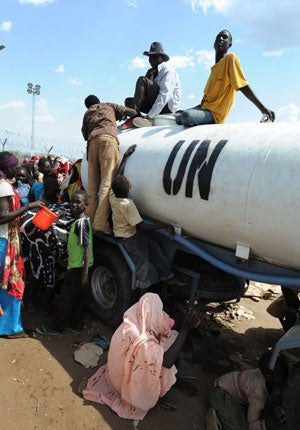Khartoum ignores Obama's plea for peace as troops drive south

Your support helps us to tell the story
From reproductive rights to climate change to Big Tech, The Independent is on the ground when the story is developing. Whether it's investigating the financials of Elon Musk's pro-Trump PAC or producing our latest documentary, 'The A Word', which shines a light on the American women fighting for reproductive rights, we know how important it is to parse out the facts from the messaging.
At such a critical moment in US history, we need reporters on the ground. Your donation allows us to keep sending journalists to speak to both sides of the story.
The Independent is trusted by Americans across the entire political spectrum. And unlike many other quality news outlets, we choose not to lock Americans out of our reporting and analysis with paywalls. We believe quality journalism should be available to everyone, paid for by those who can afford it.
Your support makes all the difference.Sudan's government has ignored international appeals for a ceasefire to continue an offensive in the country's oil-rich central provinces that threatens to push the country back into civil war. Up to 60,000 people have fled bombing raids along the prospective border with southern Sudan as fighting intensified despite calls from US President Barack Obama for Khartoum to halt military operations.
In three weeks, Sudan is formally split in two and hopes of a peaceful north-south divorce in Africa's largest country are swiftly unravelling. Most of the fighting has centred on South Kordofan, an oil-rich state on the northern side of the new border, where government forces have been accused of "ethnic cleansing". Tens of thousands of civilians have fled south or into hiding in the Nuba Mountains, a strongholds of resistance to Khartoum during the civil war which ended in 2005.
The UN said yesterday that there was a "growing sense of panic" in the state capital Kadugli where civilians have been trapped by fighting and Khartoum has shut off humanitarian access. Witnesses in the city said that bombing by northern forces continued nearby yesterday and unconfirmed reports said that a UN mission in Sudan base had been hit. The UN said that it had been prevented from helping the local population and that its staff had only five days of supplies remaining.
Authorities in Southern Sudan also accused the northern army of trying to push south from the disputed region of Abyei yesterday, despite an agreement to demilitarise the area. Abyei was overrun by northern troops last month in violation of international agreements.
Talks this week in the Ethiopian capital, Addis Ababa ended in an agreement to withdraw all forces and send in Ethiopian peacekeepers under the UN banner. But southern military spokesman Colonel Philip Aguer said yesterday that northern forces had moved south of Abyei and tried to cross the symbolically important Kiir River that has traditionally been seen as a north-south dividing line.
The government of Omar al-Bashir – wanted by the ICC for war crimes in Darfur – has denied targeting civilians and insisted it has been attacked by armed groups aligned with the southern government. At least 64 people have been killed in bombing raids, the UN says, and as many as 1.4 million people have been affected by the conflict.
President Obama warned that there was "no military solution" to the crisis, adding: "The leaders of Sudan and South Sudan must live up to their responsibilities. The government of Sudan must prevent a further escalation of this crisis by ceasing its military actions immediately, including aerial bombardments, forced displacements and campaigns of intimidation."
Sudan has been racked by near-constant civil war since winning its independence from colonial power Britain in 1956. Populations in the vast outlying areas have persistently accused the hardline Muslim central governments in Khartoum of systematic economic neglect and human rights abuses. Similar accusations underpinned an uprising in the western region of Darfur where President Bashir is accused of ordering the killing of hundreds of thousands of civilians in response.
Southerners voted overwhelmingly to secede from the north in a referendum in January and the formal recognition of the new state, South Sudan, is due on 9 July. The new country contains most of Sudan's oil reserves. Khartoum faces losing one-third of its overall revenues.
Join our commenting forum
Join thought-provoking conversations, follow other Independent readers and see their replies
Comments